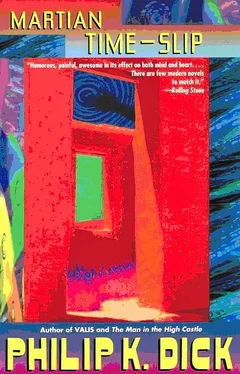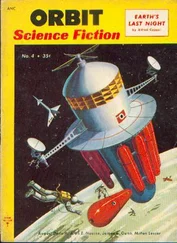Philip Kindred Dick
Martian Time-Slip
From the depths of phenobarbital slumber, Silvia Bohlen heard something that called. Sharp, it broke the layers into which she had sunk, damaging her perfect state of nonself.
“Mom,” her son called again, from outdoors.
Sitting up, she took a swallow of water from the glass by the bed; she put her bare feet on the floor and rose with difficulty. Time by the clock: nine-thirty. She found her robe, walked to the window.
I must not take any more of that, she thought. Better to succumb to the schizophrenic process, join the rest of the world. She raised the window shade; the sunlight, with its familiar reddish, dusty tinge, filled her sight and made it impossible to see. She put up her hand, calling, “What is it, David?”
“Mom, the ditch rider’s here!”
Then this must be Wednesday. She nodded, turned and walked unsteadily from the bedroom to the kitchen, where she managed to put on the good, solid, Earth-made coffeepot.
What must I do? she asked herself. All’s ready for him. David will see, anyhow. She turned on the water at the sink and splashed her face. The water, unpleasant and tainted, made her cough. We should drain the tank, she thought. Scour it, adjust the chlorine flow and see how many of the filters are plugged; perhaps all. Couldn’t the ditch rider do that? No, not the UN’s business.
“Do you need me?” she asked, opening the back door. The air swirled at her, cold and choked with the fine sand; she averted her head and listened for David’s answer. He was trained to say no.
“I guess not,” the boy grumbled.
Later, as she sat in her robe at the kitchen table drinking coffee, her plate of toast and applesauce before her, she looked out on the sight of the ditch rider arriving in his little flat-bottom boat which put-putted up the canal in its official way, never hurrying and yet always arriving on schedule. This was 1994, the second week in August. They had waited eleven days, and now they would receive their share of water from the great ditch which passed by their line of houses a mile to the Martian north.
The ditch rider had moored his boat at the sluice gate and was hopping up onto dry land, encumbered with his ringed binder--in which he kept his records--and his tools for switching the gate. He wore a gray uniform spattered with mud, high boots almost brown from the dried silt. German? But he was not; when the man turned his head she saw that his face was flat and Slavic and that in the center of the visor of his cap was a red star. It was the Russians’ turn, this time; she had lost track.
And she evidently was not the only one who had lost track of the sequence of rotation by the managing UN authorities. For now she saw that the family from the next house, the Steiners, had appeared on their front porch and were preparing to approach the ditch rider: all six of them, father and heavy-set mother and the four blonde, round, noisy Steiner girls.
It was the Steiners’ water which the rider was now turning off.
“Bitte, mein Herr,” Norbert Steiner began, but then he, too, saw the red star, and became silent.
To herself, Silvia smiled. Too bad, she thought.
Opening the back door, David hurried into the house. “Mom, you know what? The Steiners’ tank sprang a leak last night, and around half their water drained out! So they don’t have enough water stored up for their garden, and it’ll die, Mr. Steiner says.”
She nodded as she ate her last bit of toast. She lit a cigarette.
“Isn’t that terrible, Mom?” David said.
Silvia said, “And the Steiners want him to leave their water on just a little longer.”
“We can’t let their garden die. Remember all the trouble we had with our beets? And Mr. Steiner gave us that chemical from Home that killed the beetles, and we were going to give them some of our beets but we never did; we forgot.”
That was true. She recalled with a guilty start; we did promise them . . . and they’ve never said anything, even though they must remember. And David is always over there playing.
“Please go out and talk to the rider,” David begged.
She said, “I guess we could give them some of our water later on in the month; we could run a hose over to their garden. But I don’t believe them about the leak--they always want more than their share.”
“I know,” David said, hanging his head.
“They don’t deserve more, David. No one does.”
“They just don’t know how to keep their property going right,” David said. “Mr. Steiner, he doesn’t know anything about tools.”
“Then that’s their responsibility.” She felt irritable, and it occurred to her that she was not fully awake; she needed a Dexamyl, or her eyes would never be open, not until it was nightfall once more and time for another phenobarbital. Going to the medicine cabinet in the bathroom, she got down the bottle of small green heart-shaped pills, opened it, and counted; she had only twenty-three left, and soon she would have to board the big tractor-bus and cross the desert to town, to visit the pharmacy for a refill.
From above her head came a noisy, echoing gurgle. The tank on the roof, their huge tin water storage tank, had begun to fill. The ditch rider had finished switching the sluice gate; the pleas of the Steiners had been in vain.
Feeling more and more guilty, she filled a glass with water in order to take her morning pill. If only Jack were home more, she said to herself; it’s so empty around here. It’s a form of barbarism, this pettiness we’re reduced to. What’s the point of all this bickering and tension, this terrible concern over each drop of water, that dominates our lives? There should be something more. . . . We were promised so much, in the beginning.
Loudly, from a nearby house, the racket of a radio blared up suddenly; dance music, and then an announcer giving a commercial for some sort of farm machinery.
“. . . Depth and angle of the furrow,” the voice declared, echoing in the cold bright morning air, “pre-set and selfadjusting so that even the most unskilled owner can--almost the first time--“
Dance music returned; the people had turned to a different station.
The squabble of children rose up. Is it going to be like this all day? she asked herself, wondering if she could face it. And Jack, away until the weekend at his job--it was almost like not being married, like not having a man. Did I emigrate from Earth for this? She clapped her hands to her ears, trying to shut out the noise of radios and children.
I ought to be back in bed; that’s where I belong, she thought as she at last resumed dressing for the day which lay ahead of her.
In his employer’s office in downtown Bunchewood Park, Jack Bohlen talked on the radio-telephone to his father in New York City. The contact, made through a system of satellites over millions of miles of space, was none too good, as always; but Leo Bohlen was paying for the call.
“What do you mean, the Franklin D. Roosevelt Mountains?” Jack said loudly. “You must be mistaken, Dad, there’s nothing there--it’s a total waste area. Anybody in real estate can tell you that.”
His father’s faint voice came. “No, Jack, I believe it’s sound. I want to come out and have a look and discuss it with you. How’s Silvia and the boy?”
“Fine,” Jack said. “But listen--don’t commit yourself, because it’s a known fact that any Mars real estate away from the part of the canal network that works--and remember that only about one-tenth of it works--comes close to being an outright fraud.” He could not understand how his father, with his years of business experience, especially in investments in unimproved land, could have gotten on to such a bum steer. It frightened him. Maybe his dad, in the years since he had seen him, had gotten old. Letters told very little; his dad dictated them to one of his company stenographers.
Читать дальше









